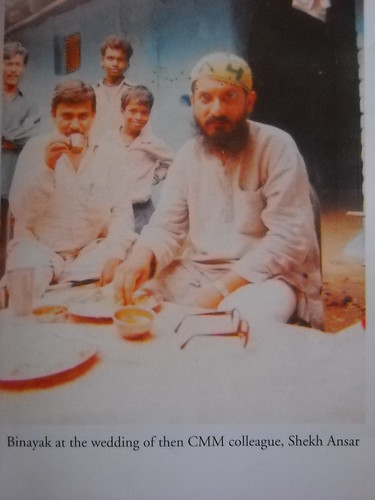By Mahtab Alam,
In the last three years, much has been written on Binayak Sen—both positive and negative. While Swapan Dasgupta and Kanchan Gupta allege him of being the ‘Bengali Che Guevara, prone to ‘reckless excitability’ and ‘an agent of evangelists’ who used his cover as ‘social worker’ with access to ‘charity’ funds’, Amartya Sen and 22 other Nobel laureates believe that Binayak has been unjustly convicted. But, what one gathers from most of the positive reports, articles and opinion pieces is that Dr. Binayak Sen is a doctor who worked beyond set patterns of medical practice and championed the cause of human rights for the tribals of Chhattisgarh and united Madhya Pradesh.
But, Binayak wasn’t concerned only about the tribals. His concern about religious minorities in India can hardly be underestimated. The very idea of growing a beard is an instructive one. Thanks to Minnie Vaid for writing a book on Binayak, that uncovers many other aspects of his life which are either untold or lesser known.

Photo from the Book, A Doctor to Defend authored by Minnie Vaid
Let me cite some incidents from his life narrated in Minnie Vaid’s book, “A Doctor to Defend—the Binayak Sen Story”. Binayak Sen was travelling in a second class compartment in a train to Purulia in 1993 along with his friend Dr. Yogesh Jain, when someone came and asked him, ‘Maualana ji, kya time hua hai?’ It might sound funny but his growing a beard like a Maulana’s was a well thought out act as Dr. Yogesh tells. Dr. Yogesh tells the author that when he asked Binayak why he had grown a beard, Binayak replied, “…(I) wanted to see what it means to be insecure, to know how it feels to be a minority in one’s own country”.
Binayak had told the author that he had read a book called ‘Black Like Me’ about a white man who put on black make-up and travelled all over America to try and see what it felt like to be a black man. Binayak found this very instructive, wanted to have the experience (what it means to be a Muslim after demolition of Babari Masjid) and he did! Though not mentioned in the book, I am told by a friend of mine, who happens to be a student of Binayak’s wife, Prof. Ilina Sen that, once Binayak traveled to Ayodhya after the demolition of the mosque, where he was stopped and not allowed to visit as he was considered a Muslim due to his beard and Kurta-pajama. However, after much questioning and arguments he was allowed to enter the premises of the makeshift Ram Temple constructed on the debris of Babri Masjid.
Binayak’s hallmark is his overriding concern for the patient’s needs in totality. Sara Bhattacharji, a close friend of Binayak tells another story from his life. During internship of his MBBS course at CMC Vellore, once he had written a prescription for Lasix (a diuretic) for a patient without including the required potassium supplement. The patient had gone home by the time. Binayak went to the medical records department and looked up for the patient’s address, went to a pharmacy where he bought the potassium and travelled all the way to his home to deliver the supplement. The author rightly notes, “This is the extent to which Binayak can go to empathise with some else’s pain”.
He is equally concerned about things going around the world, wherever people are fighting against injustices and repression. And I am sure, now adays, he would be thinking about the future of the revolution in Egypt, Tunisia and political developments in middle-east and its implications in the Indian subcontinent. I am saying this because as we are told that ‘In jail Binayak used to listen to news about Gaza on his radio, and compares the situation there with what was currently happening in Chhattisgarh…”.
We can only hope and wish that Binayak’s bail will not be denied by the Supreme Court. And all the charges forged against him will be dropped by the higher courts at-least to show that India is a democratic country!
(The author is a civil rights activist and freelance journalist currently based in Ranchi, Jharkhand)

